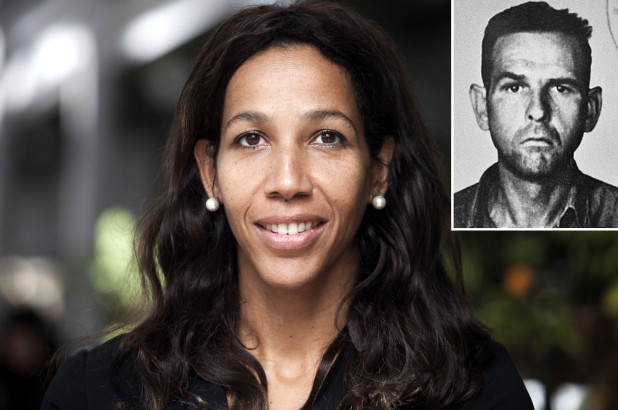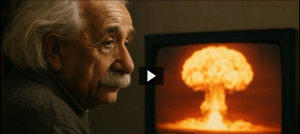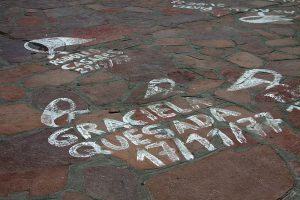“I am dreaming: I am swimming in a dark lake, the water as thick as tar. Suddenly corpses appear all around me: spindly figures, skeletons almost, that have had everything humane taken from them.”1
From an outside perspective, her life appeared perfect. Not the slightest of struggles seemed to bother her. She traveled, had a successful career, and a wonderful family. However, her life was quite the opposite. Jennifer Teege struggled with her inner demons; she appeared as a light to the world, but her mind seemed to be victimized by a mysterious sadness and a feeling that she did not know the root cause of, yet always knew that a protruding emotion was seizing her. Nonetheless, finding out the reason behind one’s sadness can be hard when one doesn’t even know why one feels that way. But what if one day you made a connection to this emotion unexpectedly, maybe at a library? This was the case for Jennifer Teege, who found out the harrowing secret of her biological grandfather Amon Goeth. Goeth was a Nazi commander responsible for the torture and mass killing of innocent Jews in Poland. He was a killer who wouldn’t have hesitated to kill his own granddaughter Jennifer if she would have ever been in his presence. This was a hidden secret that she discovered by curiosity, but it led her to the truth of who she descended from, and to the realization that she shares a cold-hearted killer’s blood. Will she let this new truth change her outlook on life or will she persevere through her new findings?On June 29, 1970, Jennifer was born in the city of Munich, Germany. Her mother Monika was twenty-five when she had a short fling with a Nigerian student. Their short affair resulted in Monika becoming pregnant with Jennifer. Jennifer’s mother battled with depression. Therefore, it was hard for her to maintain a job and provide for her daughter. So when Jennifer was four-weeks old, Monika left her at Salberg House, which was a Catholic home for infants. During her time at Salberg, Jennifer’s mother would often visit her and occasionally take Jennifer to visit her grandmother Ruth. At three years old, Jennifer was put into a foster home; four years later, at age seven, Jennifer was adopted by her foster parents, Inge and Gerhard Sieber.2 Growing up, Jennifer found great interest in learning about the Holocaust. She read book after book about the Nazi regime. She was intrigued on why the commanders of concentration camps would commit such horrific acts. During her high school years, Jennifer read Anne Franks Diary of a Young Girl. She described seeing the world through Anne’s eyes: “I felt her fear but also her optimism and her hope.”3

Teege then went on to attend Tel Aviv University in Israel, where she earned a degree in Middle Eastern and African studies. During her time in Israel, Jennifer also learned to speak Hebrew.4 She additionally befriended many Holocaust survivors where she worked at the Goethe Institute. Many of these individuals wanted to hear and learn German, while others just enjoyed being read German material.5 Although Jennifer enjoyed spending quality time with survivors, and made a friend in each one, she returned back to Germany after a suicide bomber exploded a bomb on her bus in Tel Aviv. Jennifer could have become a statistic on that day. “All I know is that I found myself walking through Tel Aviv on my own. No longer happy and outgoing, but sad and introverted. I felt no joy and no curiosity. It was as if a wall had appeared between me and my surroundings.”6 Realizing that she could lose her life in a place that was away from her loved ones, she fell back into a state of depression. Once again she was living with a burden of sadness. She described her sadness as feeling locked away inside a house with numerous doors, and not knowing what was behind those doors.7 However, those doors would soon be opened and a hidden secret would be uncovered. Jennifer Teege was about to make a brutal discovery that would soon portray an important part in her life.
“It was a moment that cut her life in two. There was the ‘before’ when she knew nothing of her family’s sinister past, and ‘after’ when she was forced to live with the truth.”8
When Jennifer was thirty-eight, on a warm August day she was at the Central Library in Hamburg looking for something on depression. As she was browsing through the shelves, Jennifer noticed a red book titled, I Have to Love my Father, Don’t I? by Matthias Kessler. Intrigued by the name and color of the book, she removed it from the shelf. On the cover was a middle aged woman named Monika Goeth. The woman was her mother. Jennifer was holding a book about her own mother.9 As she browsed through the pages, she began to realize that the monster her mother was writing about was her grandfather, who had been the infamous Nazi commander responsible for the killing of thousands of Jews in Poland. This monster was Amon Goeth. Unable to think or breathe properly, she checked out the book and waited outside the library for her husband Goetz to pick her up. For the next couple of weeks Jennifer tried to learn everything about her grandfather. She needed to know who he was and why he became a monster. As time passed her dreadful discovery made her become distant from her family; daily tasks as simple as brushing her teeth and showering were overbearing and hard to do. It felt like she was living a horrible nightmare and it wouldn’t end. At a young age, Jennifer would examine her dark skin, frizzy hair, and lanky stature in the mirror, and she saw how it differentiated her from her adoptive family. Now she looks at the lines between her nose and eyes and sees that they resemble those of her grandfather’s. “A thought flashes across my mind: I must do something about the lines, must have them botoxed, lasered, lifted!”10
What Jennifer Teege found out about her grandfather was startling. He was born Amon Leopold Goeth in Vienna, Austria. His parents decided to send him to a Catholic boarding school at a very young age. However, he eventually left the school against his parent’s wishes. At a young age Amon would play sadistic jokes and was captivated by right wing ideologies and movements. By 1931, he had converted to Nazism, the National Socialist German Workers’ Party. He then became a member of the SS security force, in which Amon’s reputation rapidly moved him towards a higher status. He soon left Vienna for Poland. By 1942 he was in charge of setting up a labor camp in Lublin, Poland. In Lublin, Amon worked for Odilo Globocnik, who was a part of the SS force. Odilo was responsible for the killing of countless Jews. Globocnik then gave Amon the responsibility of liquidating the Jews. “Liquidation meant rounding up the able ghetto population into forced labor; those too weak or too ill to work were shot, including children and the elderly.” During two days in March of 1943, Amon “ordered the clearance of the Krakow ghetto. Around 2,000 people are killed during these two days; a further 4,000 are deported, many to Auschwitz.” Amon Goeth was a man who enjoyed the thrill of killing: “in this world of men, killing was a contest, a kind of sport…It reached the point where killing a human being meant nothing more than swatting a fly…In the end the mind goes completely numb; death has entertainment values.”11 On September 13, 1946, Amon was hanged. His last words were “Heil Hitler.”12 In 1993, Steven Spielberg’s film Schindler’s List showcased Amon Goeth’s psychotic personality and the atrocities that many Jews had to endure. The film also displays the horror that happened in the camps. Although the film is gruesome, it does not fully depict the true monster that Amon was capable of being. He was a man who had beautiful features yet was a cold-hearted killer.

To try to comprehend her grandfather’s doings, she visited a variety of therapists. Psychoanalysist Peter Briendl described Jennifer’s story exceptionally: “First given up for adoption and then the discovery of her family’s history…it is heartbreaking…even her conception was a provocation.”13 Over time, she visited her mother’s home in Hasenbergl, Munich; her grandparents’ villa in Krakow; the Auschwitz concentration camp. Earlier in her life, Jennifer had never believed in fate; only in chance. However, she now believes in fate. “Some things in life are predetermined.” Her fate led her to become interested in Holocaust history, led her to Israel, to befriend Holocaust survivors, and most importantly, fate led her to the psychology section in the Hamburg library, and to her mother’s book. Through all of it, Jennifer wants to hold on to her past life because that is what will get her through her new profound truth. Amon Goeth executed a combination of around 10,000 Jews in the Krakow–Plaszow concentration camp; Amon was known as the Butcher of Plaszow, a monster, a killer. Jennifer will not let herself become another of Amon Goeth’s victims; Jennifer is her name and she is a daughter, a mother, and friend.
- Jennifer Teege and Nikola Sellmair, My Grandfather Would Have Shot Me: A Black Woman Discovers Her Family’s Nazi Past (The Experiment, 2016), 43. ↵
- Monl Basu, “Black German Woman Learns a Shocking Family Secret: Her Grandfather Was a Nazi,” CNN Online, https://www.cnn.com/2016/01/29/world/my-grandfather-would-have-shot-me/index.html. ↵
- Jennifer Teege and Nikola Sellmair, My Grandfather Would Have Shot Me: A Black Woman Discovers Her Family’s Nazi Past (The Experiment, 2016), 82. ↵
- Monl Basu, “Black German Woman Learns a Shocking Family Secret: Her Grandfather Was a Nazi,” CNN Online, https://www.cnn.com/2016/01/29/world/my-grandfather-would-have-shot-me/index.html. ↵
- Jennifer Teege and Nikola Sellmair, My Grandfather Would Have Shot Me: A Black Woman Discovers Her Family’s Nazi Past (The Experiment, 2016), 74, 75. ↵
- Jennifer Teege and Nikola Sellmair, My Grandfather Would Have Shot Me: A Black Woman Discovers Her Family’s Nazi Past (The Experiment, 2016), 577. ↵
- Monl Basu, “Black German Woman Learns a Shocking Family Secret: Her Grandfather Was a Nazi,” CNN Online, https://www.cnn.com/2016/01/29/world/my-grandfather-would-have-shot-me/index.html. ↵
- Monl Basu, “Black German Woman Learns a Shocking Family Secret: Her Grandfather Was a Nazi,” CNN Online, https://www.cnn.com/2016/01/29/world/my-grandfather-would-have-shot-me/index.html. ↵
- Jennifer Teege and Nikola Sellmair, My Grandfather Would Have Shot Me: A Black Woman Discovers Her Family’s Nazi Past (The Experiment, 2016), 20. ↵
- Jennifer Teege and Nikola Sellmair, My Grandfather Would Have Shot Me: A Black Woman Discovers Her Family’s Nazi Past (The Experiment, 2016), 55. ↵
- Jennifer Teege and Nikola Sellmair, My Grandfather Would Have Shot Me: A Black Woman Discovers Her Family’s Nazi Past (The Experiment, 2016), 96-97, 102, 111, 113, 133. ↵
- Jennifer Teege and Nikola Sellmair, My Grandfather Would Have Shot Me: A Black Woman Discovers Her Family’s Nazi Past (The Experiment, 2016), 183. ↵
- Jennifer Teege and Nikola Sellmair, My Grandfather Would Have Shot Me: A Black Woman Discovers Her Family’s Nazi Past (The Experiment, 2016), 64. ↵



57 comments
Nydia Ramirez
I gained a lot of new insight and knowledge from reading this article. The importance of the topic and material covered in the article is massive. It unveiled a lot of small details I had no idea existed prior. It is crazy to think people that committed horrid crimes have relatives that are pure hearted. What I loved about this article was the writing style. There was a strong utilization of details and strong adjectives that really strengthened the story as a whole.
Karla Fabian
I cannot imagine what Jennifer Teege must have felt when she found out that her biological grandfather was Amon Goeth, a man responsible for the torture and mass killing of innocent Jews. It is very intriguing to read how Teege even decided to go to a variety of therapists in trying to comprehend why her grandfather did what he did, killing millions of innocents. This article reflects how strong Teege is. She did not let her grandfather’s actions affect her life in a negative way, instead, she maintained a very positive attitude. This can be seen in how she interacts with survivors of the holocaust. The video in the article showed more about Teege, which was very helpful and beneficial because as readers, we get to know her more.
Paulina Gonzalez
I’ve never heard of Jenifer’s story before and this article managed to teach me something new. It must be terrible to find out how dark and sinister your own grandfather was and what legacy is left behind. It’s very interesting to see that Jennifer didn’t let her grandfather’s past affect her life in a negative way. She managed to be kind and interact with many survivors of the holocaust which shows how different she is from her grandfather. Wonderful article and including the video really allowed us to know more about her.
Christopher Hohman
Nice article. I’ve heard of Jenifer’s story before, and it is always sad that she felt such pain and sadness about the legacy of her family. Her grandfather was an evil man, perhaps one of the most evil men in history. However, Jenifer did not let his legacy define her. She did not let herself become one of his victims. Her life does seem to have taken an oddly fate like trail. She had always been interested in Nazism and the Holocaust, she lived in Israel and befriended survivors, and finally found out that she herself was related to an infamous Nazi. Still though she understood that she was not her grandfather, but that she was in fact a much better person than he was.
Elliot Avigael
I never knew that Amon Goeth had any children, let alone a descendant he wouldn’t have even have considered human. The feeling of finding out that Goeth was her blood grandfather must have been shocking, and that’s an understatement.
Jennifer must indeed be a strong woman to deal with that kind of revelation. We must never be judged by the actions of our ancestors.
Aaron Sandoval
I really liked how this article was presented, with the first half detailing Jennifer’s life, while the second half detailed the discovery and her reaction. The story that is being told seems crazy, but it has happened, and while the horrors of what her grandfather was a part of are truly evil, the fact that Jennifer was able to overcome it and not let it destroy her is extremely impressive.
Sara Guerrero
This article was not what I expected, I think that Jennifer was right in that here future was predetermined and I can’t image how she must’ve felt when she found her mother’s book. I think after Jennifer found out about her family she was able to understand her mother’s situation and why she was hidden away from such a dark secret. In a way, I see Jennifer ask for forgiveness for what he grandpa did, but she is strong in that she doesn’t let that define her in any way. Great job on this article!
Hali Garcia
This is an interesting story of a woman discovering who her family was, even though it was someone who participated in evil. It must have been incredibly difficult for Jennifer to learn that her grandfather was a known officer who killed so many people. I love how she decided that he was not going to define her and that she will move forward. Great article, I was hooked from the beginning.
Antonio Holverstott
I can sympathize with Jennifer about being related to someone who was terribly disobedient, sadistic, and racist and used these traits to his own advantage to contribute to one of humanity’s darkest periods of history. People could easily connect you to the actions of your ancestors and expect that you will be like them or even worst or people may feel that they may become their worst ancestor. I am glad that she is trying to come to grips with this unpleasant and unexpected part of her family’s history that she has been presented.
Samuel Vega
A fascinating story! Jennifer should not be judged by the actions of her grandfather. I can understand how family history important; but it shouldn’t define an individual particularly when the history is so heinous. It is remarkable how Jennifer’s life led to the discovery of her grandfather. I hope she is able to heal and not feel any responsibility whatsoever for grandfather’s actions.